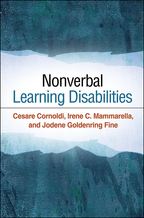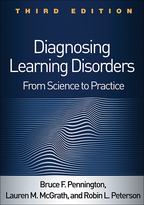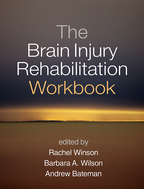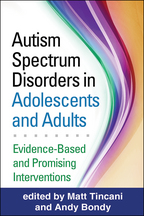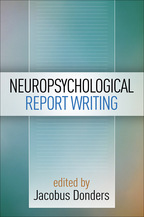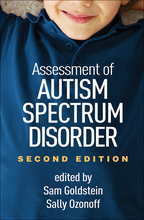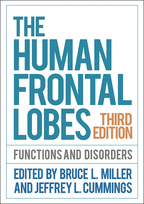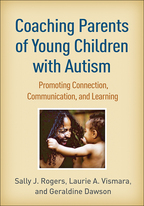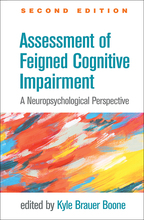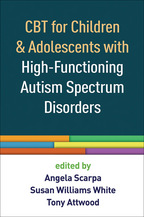Nonverbal Learning Disabilities
Cesare Cornoldi, Irene C. Mammarella, and Jodene Goldenring Fine
Foreword by Linda S. Siegel
Hardcovere-bookprint + e-book
Hardcover
orderSeptember 13, 2016
ISBN 9781462527588
Price: $43.00 202 Pages
Size: 6" x 9"
“The authors intricately detail the cognitive difficulties children with NLD face in the academic, social, and familial domains….Overall, this is an excellent and informative work with a narrative that easily flows. Highly recommended. Upper-division undergraduates and above; faculty and professionals.”

—Choice Reviews
“This book can be a welcome addition to any graduate course on psychological testing. It is thorough, well-resourced, and written by individuals with high familiarity with the field.”

—Child and Family Behavior Therapy
“Will be of interest to clinicians faced with the task of assessing students with learning difficulties and to clinicians-in-training who are interested in the evolution of the field. The authors have provided a spirited defense of the position that NLD exists as a separate, identifiable diagnostic entity and have done the field a service by gathering the relevant data in one place and integrating the findings capably.”

—PsycCRITIQUES
“Timely and important. The authors maintain an adroit balance between research and practice, providing a conceptual and dimensional approach to NLD that is helpful to both clinical and educational practitioners, as well as researchers. While acknowledging the lack of consensus on the concept of NLD and its validity as a diagnostic entity, the authors propose a set of diagnostic criteria based on the available evidence. They provide a comprehensive assessment protocol and in-depth discussion of intervention targets and strategies, together with case studies. This seminal work—which challenges current categorical approaches in clinical, psychiatric, and educational taxonomies—takes an essential step forward in reconceptualizing neurodevelopmental disorders.”

—Rosemary Tannock, PhD, Senior Scientist, Neurosciences and Mental Health Research Program, Research Institute of The Hospital for Sick Children; and Professor Emerita, University of Toronto, Canada
“Clearly written, intellectually honest, and content rich. While making no secret of their support for the validity of the NLD construct, the authors offer balanced discussion of evidence on the links between NLD and cognition, academic performance, social–emotional development, and neurological and anatomical characteristics. For the past 15 years, my colleagues and I have worked to strengthen the reading and math performance of low-achieving elementary-age students using direct explicit instructional programs. We have accelerated the progress of many, but a significant minority of children clearly need something more. It is time for special educators to partner with cognitivists, developmental specialists, neurobiologists, and others to create new routes of success for difficult-to-teach children—this book offers very interesting and potentially helpful ideas in this regard.”

—Douglas Fuchs, PhD, Professor and Nicholas Hobbs Chair of Special Education and Human Development, Vanderbilt University
“This book is much needed. It constitutes a systematic, clear, and comprehensive review of the scientific research on psychological functioning of children with NLD. The authors adopt a neurodevelopmental perspective and offer a perfect balance between theoretical knowledge and applications. This work is indispensable reading for graduate students, researchers, and practitioners in psychology, neuropsychology, and education who seek to improve the quality of life of children with NLD and their families.”

—Ruth Campos, PhD, Department of Basic Psychology, Autonomous University of Madrid, Spain
—Choice Reviews
“This book can be a welcome addition to any graduate course on psychological testing. It is thorough, well-resourced, and written by individuals with high familiarity with the field.”
—Child and Family Behavior Therapy
“Will be of interest to clinicians faced with the task of assessing students with learning difficulties and to clinicians-in-training who are interested in the evolution of the field. The authors have provided a spirited defense of the position that NLD exists as a separate, identifiable diagnostic entity and have done the field a service by gathering the relevant data in one place and integrating the findings capably.”
—PsycCRITIQUES
“Timely and important. The authors maintain an adroit balance between research and practice, providing a conceptual and dimensional approach to NLD that is helpful to both clinical and educational practitioners, as well as researchers. While acknowledging the lack of consensus on the concept of NLD and its validity as a diagnostic entity, the authors propose a set of diagnostic criteria based on the available evidence. They provide a comprehensive assessment protocol and in-depth discussion of intervention targets and strategies, together with case studies. This seminal work—which challenges current categorical approaches in clinical, psychiatric, and educational taxonomies—takes an essential step forward in reconceptualizing neurodevelopmental disorders.”
—Rosemary Tannock, PhD, Senior Scientist, Neurosciences and Mental Health Research Program, Research Institute of The Hospital for Sick Children; and Professor Emerita, University of Toronto, Canada
“Clearly written, intellectually honest, and content rich. While making no secret of their support for the validity of the NLD construct, the authors offer balanced discussion of evidence on the links between NLD and cognition, academic performance, social–emotional development, and neurological and anatomical characteristics. For the past 15 years, my colleagues and I have worked to strengthen the reading and math performance of low-achieving elementary-age students using direct explicit instructional programs. We have accelerated the progress of many, but a significant minority of children clearly need something more. It is time for special educators to partner with cognitivists, developmental specialists, neurobiologists, and others to create new routes of success for difficult-to-teach children—this book offers very interesting and potentially helpful ideas in this regard.”
—Douglas Fuchs, PhD, Professor and Nicholas Hobbs Chair of Special Education and Human Development, Vanderbilt University
“This book is much needed. It constitutes a systematic, clear, and comprehensive review of the scientific research on psychological functioning of children with NLD. The authors adopt a neurodevelopmental perspective and offer a perfect balance between theoretical knowledge and applications. This work is indispensable reading for graduate students, researchers, and practitioners in psychology, neuropsychology, and education who seek to improve the quality of life of children with NLD and their families.”
—Ruth Campos, PhD, Department of Basic Psychology, Autonomous University of Madrid, Spain

